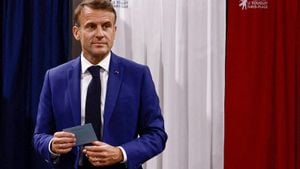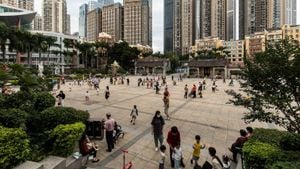A court in China has sentenced the journalist Dong Yuyu to seven years imprisonment on espionage charges, which many advocates claim are politically motivated. Dong, 62, was detained during lunch with a Japanese diplomat nearly two years ago, and his conviction has sparked outrage among press freedom advocates and human rights organizations.
According to Dong's family, the Beijing No. 2 Intermediate People’s Court found him guilty based on meetings with senior Japanese diplomats, including former ambassador Hideo Tarumi and current Chief Diplomat Masaru Okada. These diplomats were labeled as agents of what the Chinese authorities deemed "an espionage organization." This label has raised concerns about the chilling effect on diplomatic relations and the freedom of journalists who often meet foreign representatives.
His family described the verdict as "a grave injustice" not only to him but also to all journalists and Chinese citizens who value engagement with the world. They stated, "We are shocked at the Chinese authorities deeming embassies as espionage organizations, which sends a dangerous message of paranoia to the public."
The court's proceedings were heavily guarded on the day of the verdict, with police presence disallowing foreign journalists and diplomats from attending the hearing.
Dong's case is perceived as part of the broader crackdown on press freedom under President Xi Jinping's administration, which has seen increasing restrictions on media and severe penalties for those who challenge the state narrative. Despite having worked as the deputy editor for the Guangming Daily, one of the major state-run newspapers, and possessing accolades like the Nieman Fellowship from Harvard, he has been framed as a threat simply for his interaction with foreigners.
Prior to his detention, Dong had been known for advocating moderate reforms and avoided outright criticisms of the Chinese government. His family noted he had regularly met with various diplomats and journalists, indicative of his role trying to bridge international relations through journalistic pursuits, yet his arrest seems to send the opposite message.
The response from international organizations has been swift. More than 700 journalists, academics, and NGO representatives have signed petitions demanding Dong’s release. Groups such as the Committee to Protect Journalists have spoken out against his conviction—labeling it as part of a worrisome pattern where normal journalistic activities are increasingly criminalized. Beh Lih Yi, Asia programme manager at the organization, stated, "Interacting with diplomats is part of journalism. This case exemplifies the perils journalists face simply for doing their jobs. Dong should be reunited with his family at once."
Advocates have articulated concerns about how this case sets precedence for other journalists who may now fear prosecution for similar engagements.
The seismic impacts of Dong’s case extend beyond just his individual experience. Observers warn it sets a disturbing trend for civil liberties and freedom of expression within China under Xi Jinping’s administration. The Communist Party maintains strict controls over domestic media, and any interactions with foreign entities are often viewed with suspicion. Currently, China is reported as the worst country for media work, with numerous journalists held behind bars.
Dong has been held since February 2022. His family stated he was arrested after dining with diplomats at a restaurant he frequently visited with foreign friends. The Japanese diplomat was released relatively quickly post-arrest, amid protests from the Japanese government, yet Dong has remained confined throughout the legal proceedings, which dragged on without official verdicts until now.
The Tokyo embassy has refrained from commenting on the case, asserting its diplomats operate within the lawful capacities expected of them. Dong's family insists such characterization of diplomatic missions as espionage organizations symbolizes the absurdity of how the state engages with international relations.
Analysts believe Dong's sentencing may well reflect the Chinese government's broader goals of tightening control over information flow and foreign relations. Critics argue there is little substantial evidence of espionage substantiable enough to merit such severe punitive measures against Dong.
Calls for justice have intensified as rights organizations rally for Dong’s immediate release, akin to those calling for the rights of other unreasonably detained individuals. Observers note the very act of convicting someone based on political affiliations like diplomatic interactions speaks volumes about how dissent is no longer tolerated within Chinese borders.
Dong joined the Guangming Daily after obtaining his degree from Peking University’s law school back in 1987 and gained recognition among peers for his commitment to reform. Following his involvement during the 1989 Tiananmen Square protests, where he was momentarily imprisoned, he continued to navigate his career within the confines of state-operated media, writing for international publications like the New York Times and Financial Times.
Under Chinese law, those convicted of espionage can face sentences from three years to life imprisonment based on the severity of the crime. Dong’s conviction falls under the lesser category according to the laws, yet many see the true severity of the case lying much more with the ideological ramifications it imposes on press freedom and civil rights.
The international community continues to monitor developments with concern over potential repercussions for those advocating for freedom of expression and humanitarian rights. The trial and subsequent sentence of Dong Yuyu encapsulate not only the struggles of individual journalists but the pervasive obstacles faced by those striving to uphold press freedoms globally, particularly within restrictive regimes.



